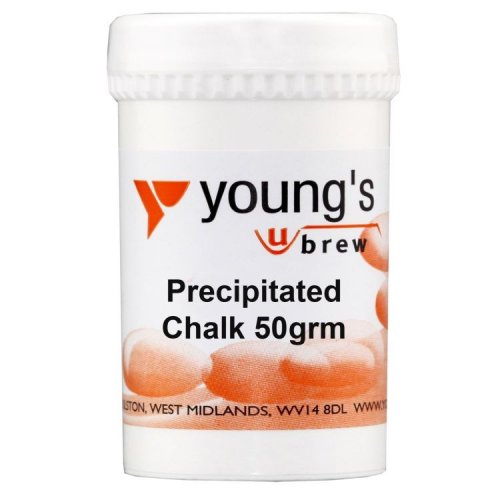Precipitated Chalk 50g (Calcium Carbonate Powder)
Precipitated Chalk (calcium carbonate powder) is an acid reducer used to reduce the acidity in wines. It is also used when brewing cider or beers, especially the dark malty variety.
Country wine that uses high acid fruit such as rhubarb or apple will need pure calcium carbonate due to the high acidity of these fruits.
Use pH strips to determine how acid your brew is.
The range starts at pH1, the highest acid to pH6, which is the lowest, while pH7 is neutral (water).
Wines or ciders with a low pH (high acidity) will taste tart, whereas wine or cider with a high pH (weak acidity) will be prone to bacterial infection and lacking bite.
pH5 is the ideal pH for mashing beer.
White wines are around pH3.2 and red wines around pH3.6.
The range for ciders is from pH3.2 to pH3.6.
If the acidity in apple juice is not high enough (i.e. pH4 or above), there is a chance of bacterial infection, and the flavour is affected.
Alternatively, if the acidity in the apple juice is too high, pH3.2 or lower, adding Precipitated Chalk (calcium carbonate powder) will help produce a healthy fermentation which will counteract the taste of the tart fruit juice.
To reduce the acidity, ideally, treat your juice or must before fermentation. However, calcium carbonate powder may be used after fermentation if required.
The dosage is 1 gram per litre (which will reduce the acidity by 1.5 parts per thousand).
Always test your beer wort or apple juice/wine must / before each addition of Precipitated Chalk until you reach the desired pH acidity.
CO2 gas will be released as the Precipitated Chalk (calcium carbonate powder) neutralises the acid in the liquid, possibly causing the fluid to foam up.
Due to the formation of the foam, this will require enough headspace in your container to allow for this.
Precipitated Chalk (calcium carbonate powder) can also produce fine sediment - if added to a finished wine or cider, be sure to leave it to stand for a week. This time allows crystals to fall out of the solution creating sediment at the vessel's bottom. Once the process is complete, rack it into a clean container before bottling.
To increase acidity in wine and cider - an acid blend of malic, tartaric and citric is the best additive. Alternatively, Gypsum or Lactic acid can be used in brewing beers.

